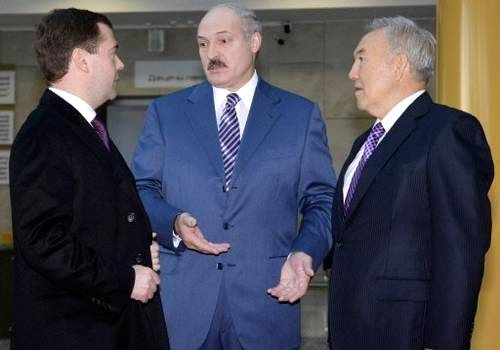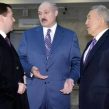
Russia Still Hopes Ukraine Will Join Customs Union
Publication: Eurasia Daily Monitor Volume: 8 Issue: 198
By:

Ukraine has made considerable progress in the free trade talks with the EU during the past several months. Kyiv and Brussels are planning to sign an association and free trade agreement in December 2011, as the free trade talks were completed in Brussels on October 19 (UNIAN, October 20). Earlier this year, Kyiv firmly rejected Moscow’s invitations to join a competing project, the Russia-dominated Customs Union (Russia, Belarus and Kazakhstan) (see EDM, April 22). However, this did not discourage Russia, whose leaders probably inspired by the recent tension in relations between Ukraine and the EU over the prosecution of former Prime Minister Yulia Tymoshenko, this month reiterated their calls for Ukraine to prefer the Customs Union to the EU.
Russian Prime Minister Vladimir Putin, who is expected to return to the presidency next year, insisted at a recent investment forum in Moscow that Customs Union membership would benefit Ukraine more than free trade with the EU. He reiterated his earlier claim that Ukraine would earn an additional $9 billion per annum if it joined the union because its market would be open to Ukraine’s metals, pipes and agricultural goods. Putin also claimed that if Ukraine reached a free trade agreement with the EU, the European market would remain closed to Ukrainian agricultural produce while its ship-building industry would stop developing and its aerospace industry would “die out.” At the same time, Putin admitted that Moscow’s efforts to lure Kyiv into the Customs Union have thus far been in vain (Interfax, October 6).
Customs Union Executive Secretary, Sergey Glazyev, spoke more about the presumed benefits of membership for Ukraine in Greece on October 9. He claimed that Ukraine’s GDP would rise by 34 percent over next 10 years if it joined the Customs Union and the Single Economic Space into which the union would be later transformed. By contrast, if Ukraine concluded a free trade agreement with the EU, Ukrainian exports would fall by some $2 billion per annum, and Russia would stop cooperation with Ukraine in the aerospace industry, machine-building, ship-building and energy fields, Glazyev warned. Glazyev also boasted that trade between the three current union members rose by more than one third year-on-year in the first half of 2011 (UNIAN, October 9).
While Russia may have benefited from establishing the Customs Union, this is not necessarily true of the other members, judging by recent complaints from the Belarusian President Alyaksandr Lukashenka. Speaking at a recent press conference for Russian journalists, he blamed the global economic crisis, high Russian energy prices and the Customs Union for the severe currency crisis in Belarus. In particular, Lukashenka recalled that the prohibitive duties imposed on imported cars last summer, benefited the Russian car industry, but prompted Belarusians to rush to buy used cars imported from the EU early in the year. As a result, he said, Belarus lost $3 billion. Lukashenka complained that conditions for Customs Union members have been unequal (Charter 97, October 7).
Ukraine’s Infrastructure Minister, Borys Kolesnykov, rejected Moscow’s warnings, speaking on a talk-show on Inter TV on October 7. He explained Putin’s invitations to join the Customs Union by the desire to increase Russia’s sphere of influence and reiterated that Ukraine may not join because it is bound by obligations to the (World Trade Organization). While Ukraine joined the WTO in 2008, none of the three CU members has achieved that yet. Kolesnykov flatly dismissed Moscow’s grim predictions on Ukraine’s aerospace and ship-building industry. He said neither the EU nor Russia has been the main markets for Ukrainian aircraft and predicted that the domestic ship-building would continue to develop in partnership with EU shipyards.
Kolesnykov’s optimism was based, in particular, on the results of the September round of the free trade talks with the EU. Brussels agreed to increase two- to four-fold the quotas on agricultural imports from Ukraine, Agriculture Minister Mykola Prysyazhnyuk announced. This had been one of the few remaining stumbling blocks in the talks. As a result, the import to the EU of Ukraine’s main agricultural commodity, grain, should double. Ukrainian meat, egg, sugar and biofuel producers also expect a breakthrough in trade with the EU (Kommersant-Ukraine, September 26).
Despite all the progress and the optimism of Ukrainian officials, Russia still has reason to hope that the talks with the EU will fall through in which case Ukraine may reconsider its attitude to the Customs Union. EU officials made it clear recently that the association and free trade accord could be blocked at the stage of ratification next year over Tymoshenko’s prosecution even if the accord itself were finalized this year (see EDM, October 5). The EU foreign policy chief, Catherine Ashton, confirmed this at the EU Foreign Affairs Council on October 10 (UNIAN, October 10). Ukrainian President Viktor Yanukovych’s visit to Brussels, scheduled for October 20, was postponed indefinitely over Tymoshenko. Meanwhile, meeting with Yanukovych in Donetsk on October 18, Russian President Dmitry Medvedev urged Ukraine to act fast, saying that although Russia did not set any timeframe for Ukraine to join the Customs Union, Kyiv would have to either become a full member soon or choose its own way. Yanukovych cautiously replied that Ukraine would prefer to see how the union works in practice and wait for Russia and Kazakhstan to join the WTO first (Ukrainski Novyny, October 18).




